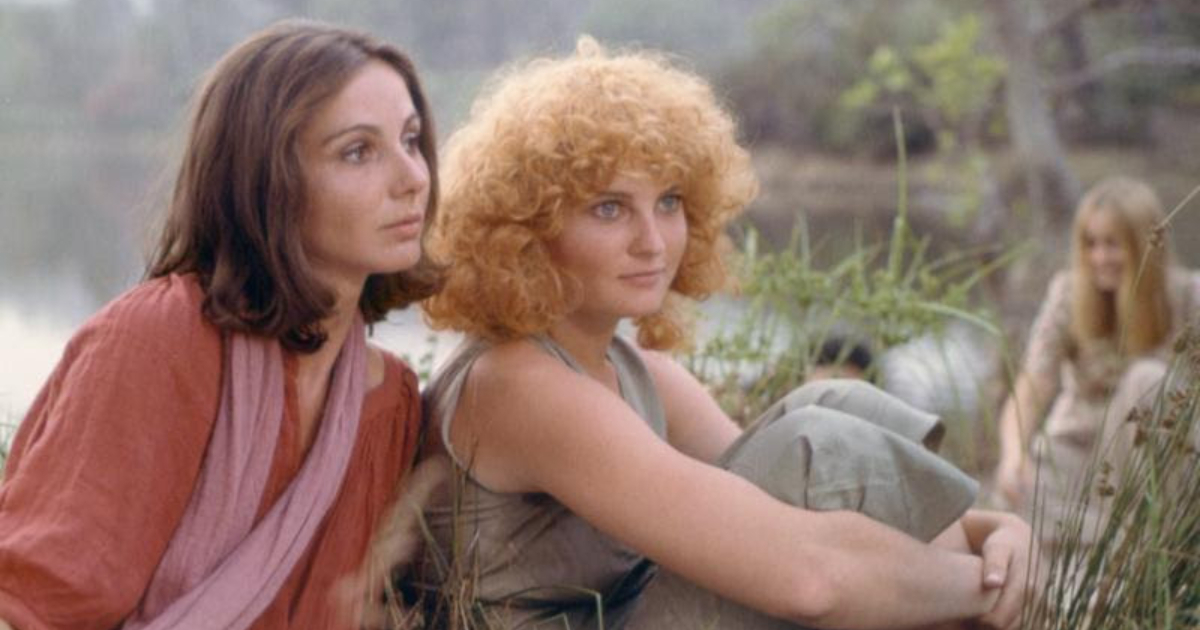
Now clocking in at 90 years young (her birthday was just May 30th, belated happy birthday), and a newly minted Oscar nominee and honorary winner, Agnes Varda has become the topic of much conversation in the world of cinephilia. Seen as a titan of the French New Wave more or less since her debut within that scene, Varda’s career has spanned decades, generations, genres and even fiction and non-fiction. However, there are still a few hidden masterworks within this relatively large body of work just waiting for rediscovery.
One of those films has just seen that very revival happen, as her superlative 1977 masterpiece One Sings, The Other Doesn’t is back in theaters stateside, with a new 2K restoration from the folks at Janus Films.
Billed as a “feminist musical,” One Sings is one of Varda’s most entrancing works, a film that defies real description on terms of genre, instead feeling at once like a melodrama about two women and their ever-changing friendship as well as a powerfully honest look at the importance of choice and free will within one’s life.
The opening film of the 1977 New York Film Festival, One Sings tells the story introduces us to Pauline (who will go by the moniker of Pomme after getting involved with a ragtag group of street performers), who befriends a mother of two named Suzanne after encountering her photographer husband whilst perusing a gallery. The two spark a lively friendship, a connection that is tested after Pauline is sent away after tricking her parents into helping cover the costs of an abortion for Suzanne. Set against the backdrop of growing civil unrest and ultimately the events of May 1968, the film has been seen as a feminist text that attempts to give a nuanced look at the role of women in society, a film that waxes poetically about the importance of abortion and the right to have one, while in equal measure celebrating the process of becoming a mother. It’s a film of, maybe not extremes but of definitive empathy, a film of love and loss, of life and death, of human connection and life changing break ups. Oh, and it’s also a musical. A damn good one at that.
At first glance, one certainly finds the film’s formal choices to be the most enticing. Musical scenes punctuate the film, turning what is otherwise a relatively stayed drama into an almost impressionistic, maybe magical realist work. The musical numbers, while ostensibly static in the way they’re capture by the camera, are captivating thanks to both the wonderful costume design and also the superb photography. The cinematography here is rich in pastels and every shot seems to have the same haze one sees in the images they imagine while reading a postcard. Fitting, really, as postcards play a major role throughout the film, which finds Pomme and Suzanne torn apart and only able to connect through letters read in voice over. We watch via almost documentary-like footage as Pomme travels through countries like France and specifically Iran, which is shot in a manner that’s loving and captivated by the change in pace.
The two are ultimately brought back together close to a decade later, and we begin to see the changes both in them on a personal level, but also the evolution of their relationship and their views on the world they live in. Thrust back in each others worlds through their shared attendance at a protest in support of a woman on trial for having an abortion, the pair share their new outlooks on life, with Suzanne evolving into a single mother and owner of a family planning center, and Pomme jumping fully into her music, specifically the work done with her all female group Orchid. Through these changes we become privy to Varda’s own textured and nuanced look at then modern day feminism, a feminism fueled by a desire for pure, unbridled choice and free will. One Sings is a meditative film, a thoughtful insight into female friendship and the importance of outspoken activism, concluding on a note that’s truly breathtaking.
Now in theaters thanks to Janus Films, one can only imagine that a Criterion Collection home video release will be right around the corner. Both of Varda’s leads here are still with us, so as far as supplemental material for this said release goes, a conversation between these two would be incredibly welcome. Therese Liotard as Suzanne and Valerie Mairesse as Pomme are absolute revelations here, particularly the former. While Mairesse’s performance is more “showy,” Liotard’s turn as the resigned Suzanne is at once devastating, and yet as her character begins to evolve one sees a real strength in her turn. Mairesse is admittedly quite good as well, giving herself over to a role that’s more free and fitting of the lively musical numbers in which she really shines. Obviously a conversation with Varda would be ideal, but so would a video essay on the politics that come through and came out of a film like this. It’s a specific moment in time and space, and a deep dive into the post May 1968 revolution would be a compelling piece of scholarship.
But that’s all a long way off. For one week at NYC’s BAMcinematek, beginning June 1, Varda’s One Sings, The Other Doesn’t will be showing, and for more information head over the the BAM website.



